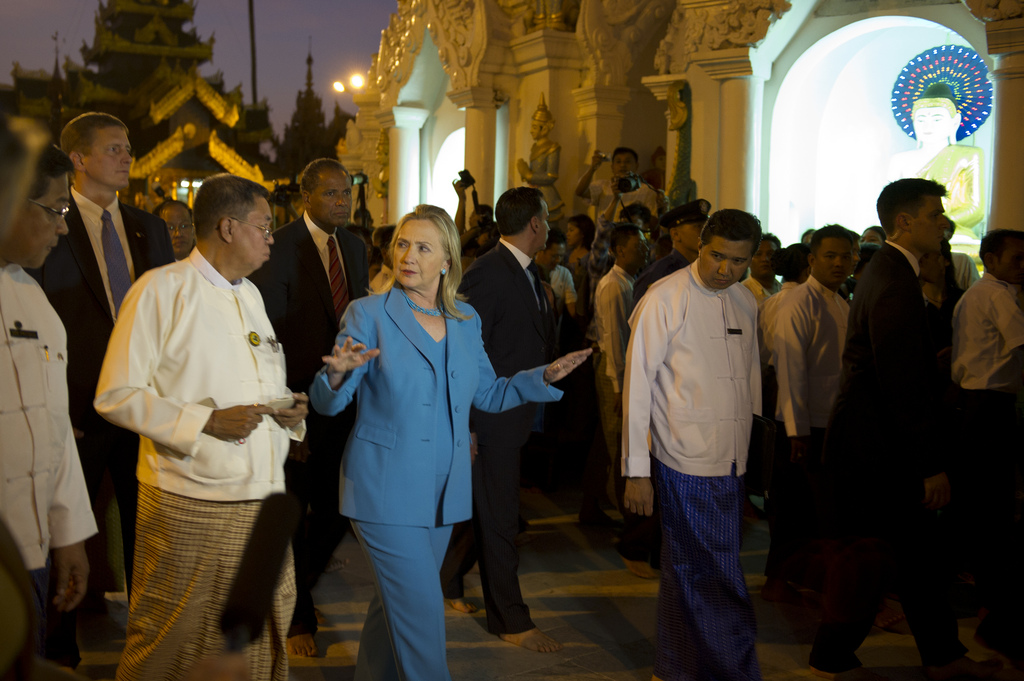The Peninsula
Clinton’s Visit to Burma: The North Korea Factor and Future Reforms

By Nicholas Hamisevicz
U.S. Secretary of State Hillary Clinton made a historic visit to Burma last week to assess some of the reforms undertaken by the regime. During her trip, she rightfully insisted that one of the changes the Burmese government must enact is to end its illicit activities with North Korea. Korea watchers need to study this relationship more to help policy makers decide if Burma really is changing. Moreover, following the development of the potential reforms in Burma, along with the response from the United States and the international community, will help prepare for a time if North Korea ever starts enacting flickers of reforms similar to Burma.
As two authoritarian regimes with a history of human rights violations and the suppression of democracy, relations between Burma and North Korea are worrisome. This summer, the U.S. navy followed another North Korea cargo ship, the MV Light, that was suspected of carrying missile components from North Korea to Burma. A U.S. destroyer tracked the ship, which discontinued its trip and returned to North Korea. This was similar to the incident in 2009 when the U.S. navy tracked the Kang Nam, also suspected of carrying illicit cargo, and forced it to turn around as well. Military cooperation, perceived trade over missile technology and parts, combined with rumors over North Korean assistance on nuclear weapons for Burma, caused the U.S. to correctly contend that Burma end these activities with North Korea if it truly wants to change.
Although connected by these dangerous policies, Burma differs from North Korea in an important way: it has a democratic opposition leader in Nobel Peace Prize winner Aung San Suu Kyi. As part of the slow change in Burma, the authoritarian government released her from house arrest, allowed the government controlled media to talk about her, and arranged for her to meet with Thein Sein, the former general now president. Granted the Burmese government has done this before, but Aung San Suu Kyi’s “cautious optimism,” both for the reforms and U.S. engagement, helped bring Secretary Clinton to Burma. With no democratic opposition leader in sight in North Korea, appropriately responding in the future to any type of positive change will be even more difficult.
If a slow change similar to Burma’s current actions ever started in North Korea (a big “if”), the threshold of suspicion and concern might be even higher, particularly because of prior failed talks with North Korea over nuclear issues. Underlining that point, as Secretary Clinton was heading to Burma to investigate their reforms; North Korea was announcing progress on their light water reactor. If not a violation, the improvement of the facility is contrary to UN resolutions and other agreements.
With the Six Party Talks still suspended, there hasn’t been a sufficient response from North Korea acknowledging the sinking of the South Korean naval corvette and shelling Yeonpyeong Island. Thus, it seems unlikely that North Korea would take actions comparable to Burma in the near future. Yet the determination of North Korea’s sincerity along with the policy response will be analogous. The secret nature of the regimes, histories of illicit activity, serious human rights violations, lack of democratic processes, and the need to consult closely with Congress on sanctions policies, are all issues that policy makers will have to deal with during a reform or changing period in either Burma or North Korea.
Burma, like North Korea, has a history of enacting small reforms to gain favor with the international community only to retract them later. The Burma – North Korea relationship will be an important factor in determining if Burma is truly changing. Thus, Korea analysts need to continue to follow this interaction to help calculate Burma’s actual response to Secretary Clinton’s insistence of a cessation of illicit activities with North Korea. Furthermore, the lessons learned from the current situation with Burma can assist in developing proper a response if the authoritarian government in North Korea were ever to start similar changes.
Nicholas Hamisevicz is the Director of Research and Academic Affairs for the Korea Economic Institute. The views represented here are his own.
